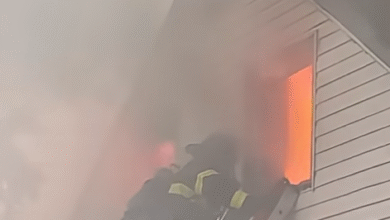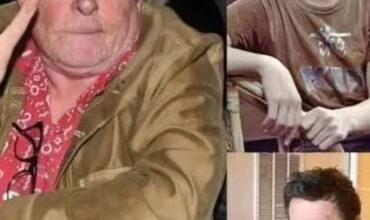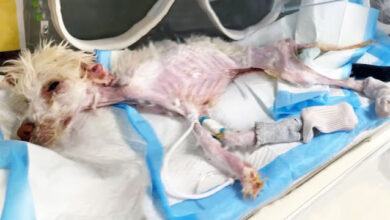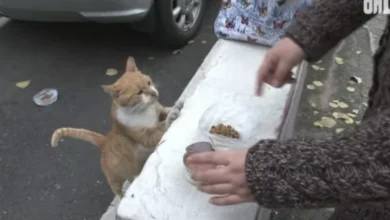“Lucky: A Soldier’s Unlikely Companion”.
In the dust and chaos of war, amidst the deafening roar of artillery and the constant uncertainty of survival, there was a quiet moment of unexpected companionship. A young soldier, weary and worn from months on the frontlines, spotted a small, thin dog wandering aimlessly through the camp. His coat was patchy, riddled with scars from past hardships, and his ribs showed through his fur like the bars of a prison. Most would have passed by, assuming the stray would not last the day. But something about the dog’s calm, unjudging eyes caught the soldier’s attention. He knelt slowly, extending a hand with a scrap of food, and the dog approached cautiously, sniffing before accepting the gesture.

They called him Lucky, almost ironically at first, because in a place defined by loss and unpredictability, luck seemed a scarce commodity. Yet, as days turned into weeks, the name proved prophetic. Lucky wasn’t trained, wasn’t disciplined, and had no role in the military. He couldn’t carry supplies, alert soldiers to danger, or perform any tactical function. But what he could do, in a way that no orders or drills ever could, was bring comfort. He would curl against the soldier’s side at night, sharing warmth, listening to whispered fears, and reminding him, without words, that he wasn’t alone. In a war where every day brought the possibility of separation from friends, from life itself, Lucky offered something precious: a steady, unshakable presence.
The bond between them grew slowly, built on scraps of food, shared glances, and silent companionship. The soldier began to look forward to Lucky’s nudges, to the soft weight of his head on his knee, to the quiet reassurance that he wasn’t facing the horrors of war entirely on his own. Other soldiers in the camp noticed it too. In the dead of night, when the camp was silent except for distant gunfire, they would see the pair huddled together, drawing strength from each other. Lucky, once a wandering, uncertain stray, had found a purpose beyond survival: he was a healer of invisible wounds, a guardian of fragile hearts.
Months passed. Battles raged. Friends were lost, and the weight of memories pressed heavily on the soldier’s shoulders. Yet Lucky remained, steadfast and unwavering. When deployment finally ended, the soldier faced an impossible choice. He couldn’t leave Lucky behind. The dog had become family, a reminder of resilience, hope, and the small joys that persisted even amid devastation. Papers were filed, rescues rallied, and after months of waiting and navigating bureaucracies, the day came when Lucky could follow him home.
When the plane touched down, Lucky trotted beside the soldier, tail wagging, ears perked, eyes shining with the quiet wisdom of one who had endured and survived. From the dust of a war zone to the soft grass of a backyard, their journey was more than a rescue—it was proof that love can persist in the harshest circumstances. That sometimes, it doesn’t come in grand gestures or heroic acts, but in the simple, steadfast companionship of a four-legged friend. Lucky wasn’t just a dog. He was hope. He was comfort. He was the living reminder that even in the darkest times, the heart has a remarkable capacity to heal.
And as the sun set over the quiet home, the soldier and Lucky sat side by side, no words necessary, knowing that the war might have left scars, but it had also given them each other.





